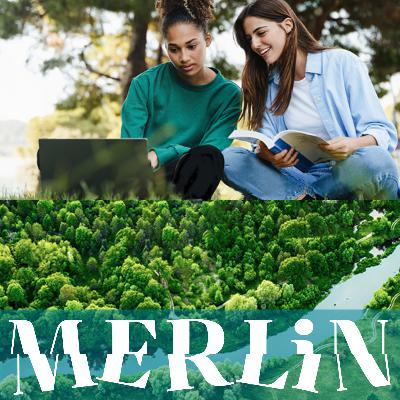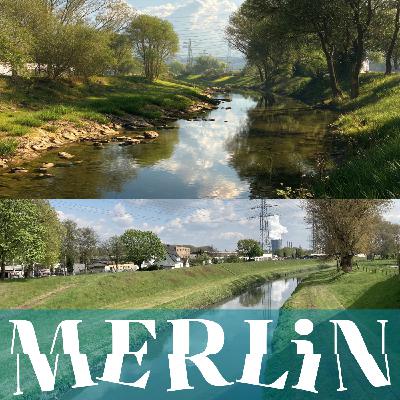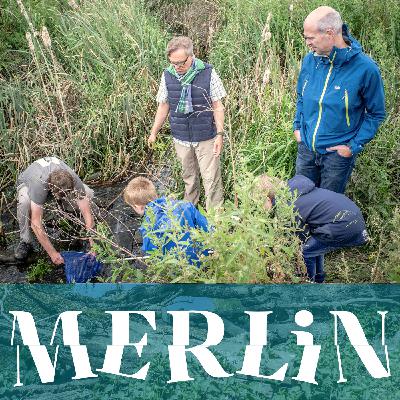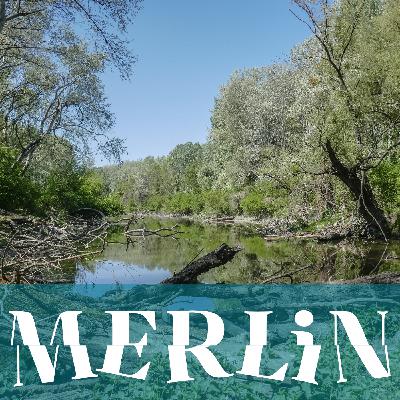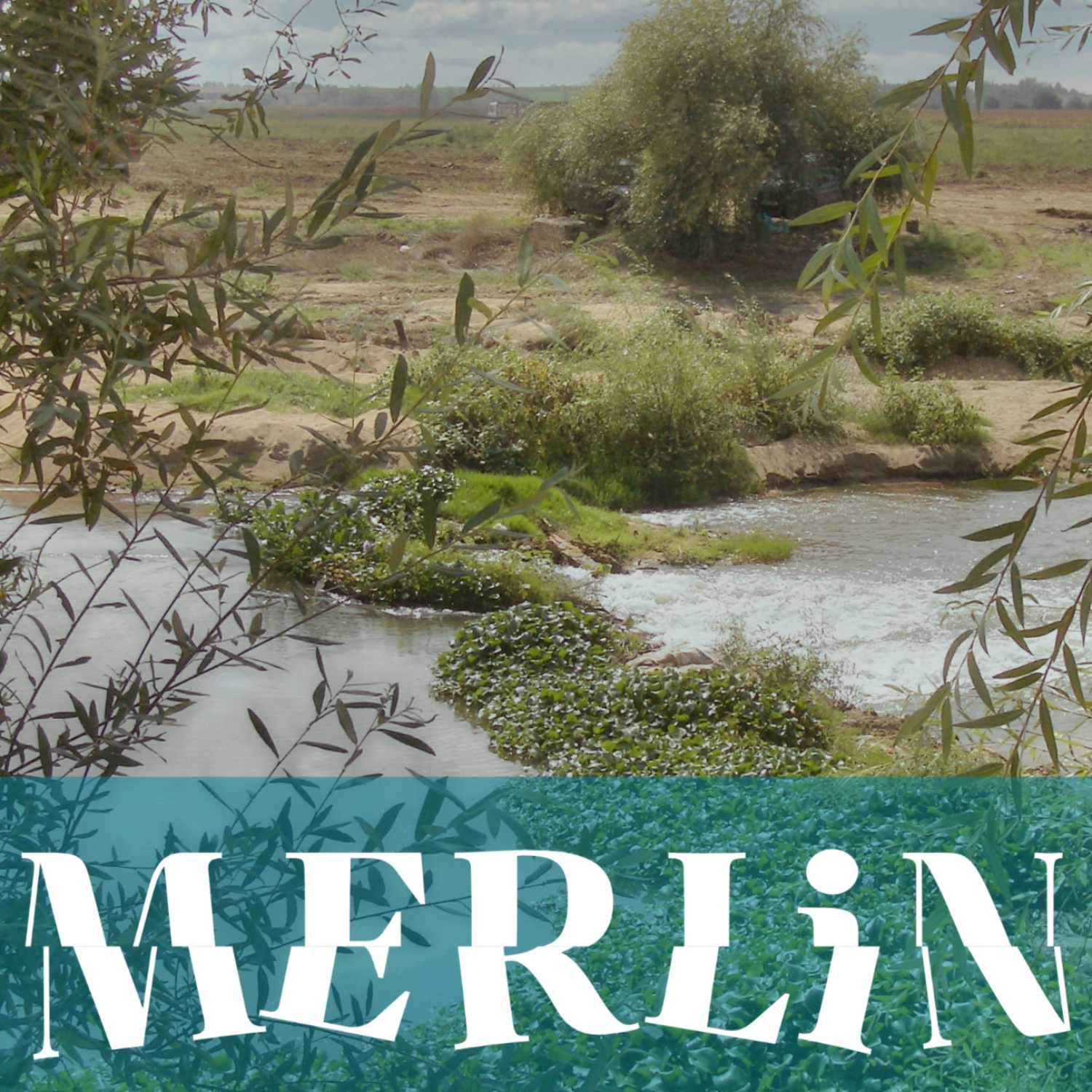Discover MERLIN Podcast: Bringing Europe’s freshwaters back to life
MERLIN Podcast: Bringing Europe’s freshwaters back to life

MERLIN Podcast: Bringing Europe’s freshwaters back to life
Author: MERLIN project
Subscribed: 3Played: 16Subscribe
Share
© MERLIN project 2022
Description
Europe’s freshwaters are in an alarming state. Water pollution, habitat destruction and the ongoing effects of climate change have caused significant biodiversity loss and ecological decline across the continent. There is a pressing need for major freshwater restoration projects which tackle these declines and bring rivers, streams, peatlands and wetlands back to life.
MERLIN is a major European Union funded project which is investing millions of Euros to help mainstream freshwater restoration across the continent over the coming years. This podcast follows the MERLIN project in this journey. It offers a behind the scenes look at some of the continent’s most ambitious freshwater restoration projects carried out through cutting-edge aquatic science and conservation.
MERLIN is a major European Union funded project which is investing millions of Euros to help mainstream freshwater restoration across the continent over the coming years. This podcast follows the MERLIN project in this journey. It offers a behind the scenes look at some of the continent’s most ambitious freshwater restoration projects carried out through cutting-edge aquatic science and conservation.
13 Episodes
Reverse
In this podcast we take a tour of the MERLIN Academy, an online platform which offers free resources and training to support researchers, practitioners and policy makers in applying cutting-edge freshwater restoration concepts to their work.We hear from Academy coordinator Astrid Schmidt-Kloiber from BOKU, and module leaders Erica Zaja from CEH, Gerardo Andalzua from ECOLOGIC and Kerry Waylen from the James Hutton Institute, alongside reflections from Academy user Lars Kristian Selbekk.The interviewees emphasise the importance of sharing free, open-access information on freshwater restoration to wide audiences. They discuss the importance of nature-based solutions, financing and economics, stakeholder engagement and governance to contemporary restoration approaches.https://project-merlin.eu/academy.html
Harnessing the potential of natural processes in freshwater restoration can create significant ecological, social and economic benefits, according to a major new report. Researchers from the MERLIN project analysed restoration monitoring data from eighteen rivers, streams and wetlands across Europe to assess the impacts of so-called ‘nature-based solutions’ on the environment and society. Such approaches aim to help amplify natural processes to benefit both people and nature. For example, a healthy wetland can help filter water pollution and buffer floodwaters, whilst planting so-called ‘riparian zones’ of trees and other vegetation along river banks can help provide valuable biodiversity habitat, keep water bodies cool, and lock up carbon to help mitigate climate change. The new report explores the impacts of a diverse range of European freshwater restoration strategies using nature-based solutions. These include peatland rewetting, beaver reintroduction, floodplain restoration and reconnection across a variety of landscapes. The results show that such restoration approaches can generate significant benefits for nature and society. In particular, many of the impacts support the goals of the European Green Deal, which aims to support climate neutrality, sustainable economies and healthy, diverse ecosystems across the continent.In this podcast, we hear from two MERLIN researchers behind the new report: Laura Pott from the University of Duisburg-Essen, and Axel Schwerk from the Warsaw University of Life Sciences. Laura and Axel cover a range of topics including how to monitor the impacts of nature-based solutions in complex landscapes across Europe, the importance of engaging stakeholder groups around an ecosystem, and the value of Theory of Change approaches in helping map how a restored landscape might develop over time.
Restoring our natural ecosystems is a task that is never really finished: science progresses; governments change; technology advances; society shifts; funding pots appear and disappear. And all the time, our rivers, lakes, streams and wetlands are a constant; their fate determined by the choices we make about them. In a time of rapid ecological loss and the ongoing climate emergency, it can be hard to think hopefully about the future of our ecosystems.In this podcast we hear from four inspirational young scientists who are helping restore Europe’s freshwaters, and with it, hope for the future of our natural world. The four scientists all work on the EU MERLIN project, but each have their own research focus. They are Miriam Colls Lozano from the University of the Basque Country, Andrea Schneider from the University of Duisburg-Essen, Viviane Cavalcanti from DELTARES and Joselyn Verónica Arreaga Espin from BOKU.We hear about the challenges of bringing disparate communities together through freshwater restoration, fostering exchange and collaboration between different communities, thinking creatively about funding restoration in the future, and strategies for bringing the public and policy makers on board with ambitious restoration programmes. The thread that runs through all these themes is the need for good communication in fostering positive change for the future.
In this podcast we take a behind the scenes look at environmental restoration in Europe on the cusp of what will likely prove to be a transformative year. First, we find out about the EU’s big environmental policy, the Green Deal, then about the ambitious new Nature Restoration Law adopted last year. We then hear from four EU restoration projects about the challenges of planning, financing and carrying out restoration on freshwaters, forests, wetlands and coastlines across the continent.Podcast host Rob St John speaks to Colombe Warin from the European Commission, Shane McGuinness from WaterLANDS, Agustín Sánchez-Arcilla from REST-COAST, Elisabeth Schatzdorfer from SUPERB and Sebastian Birk from MERLIN to get the inside story on restoring Europe's landscapes.Four key themes emerge around contemporary restoration in Europe: the use of nature-based solutions; the importance of bringing communities and stakeholders together; the challenges of financing ambitious restoration projects; and the need to upscale restoration activities from individual sites to entire landscapes and watersheds.
It's increasingly recognised that restoring damaged ecosystems is not only about improving habitats for wildlife, it is also vital to consider the needs of the people who live and work in a restoration landscape.In this podcast we hear stories about how community has been placed at the heart of freshwater restoration projects. We hear from Tal Marciano Ratner about how the restoration of the Tzipori watershed in Israel offers a meeting place for people from different religions and ethnicities to come together in a time of great unrest and conflict.Ruben Rocha from Dam Removal Europe talks about the challenges of communicating the benefits of dam removal to local communities, and describes how he is beginning to see the demand for removal projects coming from communities themselves. Roland Bischof and Julia von Gönner from iDiv in Germany tell us about the innovative citizen science work in the FLOW project, where the public can help scientists generate valuable data about the health of their streams.Robert Arlinghaus from IGB and Humboldt University in Germany describes his long-standing work with angling communities, outlining how a productive form of aquatic stewardship can emerge from their interactions with nature. Finally, María Sánchez from ECOLISE outlines how community-led initiatives across Europe are helping give people a stronger voice in shaping environmental restoration.
This is a podcast telling stories about how restoration gets done across Europe. First we hear from Joshua Royte, a conservation scientist working for the Nature Conservancy in the USA. Josh has led ambitious river restoration projects across Maine, and is now an advisor to the EU MERLIN project. We hear Josh’s perspective on freshwater restoration in Europe, and the work the MERLIN project is doing to help bring its rivers, streams and wetlands back to life.This work is explored in five fascinating stories from sites across Europe, each of which highlights the complexities of getting freshwater restoration done. Arturo Elosegi from the University of the Basque Country narrates a long-running – and now successful – story about working with communities to address local opposition to dam removal on the Deba River. Charlotte Neary from the Forth Rivers Trust in Scotland highlights the importance of finding and training local contractors to help make restoration a reality along the Forth Catchment, even when it requires unusual traditional methods such as water dowsing.Nadine Gerner from Emschergenossenschaft tells the story of wildflower meadows blooming along the banks of the Emscher River in Germany, which was once so neglected that it became an open sewer. Nadine highlights the need for convincing stories about the success of such nature-based solutions in upscaling their use in restoration. Matea Jarak from WWF Adria recounts an eye-opening story from the Hutovo Blato peatlands in Bosnia-Herzegovina, where a major release of water from a nearby hydropower plant flooded the restoration site. Matea highlights the importance of clear communication with people and organisations around a restoration area to avoid such catastrophic issues.Finally, Iulia Puiu from WWF Romania shares the story of how she and her colleagues have been working to restore the floodplains of the Danube River, in order to buffer the effects of floods and droughts exacerbated by the ongoing climate emergency. A key challenge for Iulia and her team is communicating the need to return natural processes to floodplains which have been drained and developed for many years.Together, the stories give a 'behind the scenes' snapshot of freshwater restoration projects taking place across Europe. They highlight that restoration is never a simple, straightforward process: Instead one that often requires communication, persistence and improvisation in equal measures.
Join us on the banks of the Danube River in Austria to hear how ambitious restoration projects are helping free the river from human alterations. We meet Robert Tögel and Alice Kaufmann from viadonau and Silke Drexler from BOKU beside the river to hear about how restoring its banks and side-arms is helping benefit both people and nature. As the trio explain, this work is a process of 'learning from the river' to help create space for natural processes to return, whilst at the same time making sure that navigation routes along the river are not impeded.Back in Vienna, we hear from Helmut Habersack in the recently-opened BOKU River Lab to find out how centuries of alterations of the river interact with emerging pressures from the climate emergency and plastic pollution. We speak to Piret Nõukas from the Research Executive Agency at the European Commission to get a wider picture of how freshwater restoration work in MERLIN fits in with wider EU environmental policies like the Green Deal. And finally, we hear from Eva Hernández, co-ordinator of the WWF's Living European Rivers initiative to discuss the pressing need to restore rivers across the continent, and how the proposed EU Nature Restoration Law – if passed – could help achieve this goal.
In this episode we explore the issues around stream restoration in the Sorraia catchment in Central Portugal. Restoration of the Sorraia river needs to be able to navigate the needs of intensive agriculture in a landscape increasingly affected by the climate crisis. Walking along the banks of the river, we meet a range of freshwater scientists, activists, farmers and policy experts to understand the big issues in the Sorraia catchment, and the ways in which restoration is increasingly making space for this river in the landscape. We also hear about how work on the Sorraia relates to wider debates over farming, freshwater restoration and the proposed EU Nature Restoration Law.
In October 2023, the WWF released a major report stating that freshwater has long been significantly undervalued in global economies, leading to widespread environmental costs. The report estimates that the annual economic value of water and freshwater ecosystems globally is $58 trillion – a figure equivalent to 60% of global Gross Domestic Product (or GDP). This startling figure was calculated by estimating the economic value that rivers, streams, lakes, reservoirs and wetlands generate to human societies. The report showed that freshwater ecosystems are not only vital for sustaining everyday societies, but they also provide invaluable life-support systems which help maintain the health of both people and the planet. In this episode of the MERLIN podcast co-hosts Rob St John and Sien Kok deep-dive into key topics around the economics of water.Rob and Sien explore how economic thinking can help make more informed decisions about how to manage freshwater ecosystems, and similarly how it can strengthen arguments over the pressing need to conserve and restore them. We hear expert perspectives from three individuals working in water economics in Europe – Eduard Interwies, Phillipe Le Coent and Rob van der Veeren – alongside an ecologist's perspective from MERLIN project leader Daniel Hering. The interviews introduce key concepts such as cost-benefit analysis, water pricing and the polluter pays principle, and how they relate to policies like the EU Nature Restoration Law and Water Framework Directive, and environmental management approaches like nature-based solutions.
Nature-based solutions are a hot topic right now. So-called 'NbS' are environmental management approaches that use natural processes to help tackle socio-environmental challenges such as climate change, biodiversity loss, flooding, food production and health and wellbeing. The MERLIN project explores how the benefits from nature-based solutions can help foster collaborations between different economic sectors to help mainstream freshwater restoration. MERLIN works with representatives from six economic sectors – agriculture, hydropower, insurance, navigation, peat extraction, and water supply and sanitation – to encourage the adoption of nature-based solutions in their activities across Europe.MERLIN project partners recently released a briefing exploring how nature-based solutions are understood across these sectors in Europe, and – vitally – how they might help encourage collaborations which strengthen restoration efforts. In this podcast, host Rob St John speaks to project partners who work with these sectors, and in doing so, explore the key issues highlighted in the briefing. Rob talks to: Esther Carmen (Hutton Institute), Sanja Pokrajac (WWF Central and Eastern Europe), Alhassan Ibrahim (Hutton Institute), Jack Rieley (International Peatland Society), Tamas Gruber (WWF Hungary), Kirsty Blackstock (Hutton Institute) and Mia Ebeltoft (MERLIN).Read the briefing here: https://project-merlin.eu/deliverables.html
Peatlands and wetlands are vital landscapes. They store carbon and so help mitigate the harmful effects of climate change, they help buffer floodwaters and naturally filter drinking water, and they are often rich habitats for biodiversity. But peatlands and wetlands have been widely drained, altered and lost across Europe as a result of human actions.This episode explores how peatlands and wetlands across the continent are being restored through a series of ambitious projects supported by the MERLIN project. Podcast host Rob St John meets a range of restoration scientists and managers implementing so-called 'nature-based solutions' at their sites across Europe. Their schemes include beaver reintroduction, peatland 'rewetting' and wet woodland restoration.We also hear from MERLIN project coordinator Dr Sebastian Birk on the need for fresh thinking around how to finance restoration schemes. Dr Birk discusses the challenges of accounting for factors such as carbon storage when assessing the benefits that restoration can bring to society.
This episode explores the big ideas that are shaping how ambitious freshwater restoration projects are being carried out across Europe. From dam removal to floodplain restoration, the European Union funded MERLIN project is investing millions of euros to disrupt and transform existing ways of carrying out freshwater restoration.But what do these keywords – transformation and disruption – actually mean in practice? And what are the underlying inspirations that motivate scientists and environmentalists to help bring Europe’s freshwaters back to life?In September 2022 podcast host Rob St John travelled to Fulda, just outside Frankfurt in Germany, to attend the first MERLIN all-partner meeting. At the meeting Rob spoke to project partners from all over Europe to find out about how they’re working together to research, plan, finance and implement major freshwater restoration projects. The aim of this work is to encourage healthier European rivers, streams, peatlands and wetlands, which aren’t only good for nature, but also bring many social and economic benefits.
In July 2022 podcast host Rob St John travelled to the Netherlands to meet MERLIN practitioners working on the project’s large river restoration sites. Over a number of hot, sunny days the team explored floodplains across the Rhine Delta which had been restored through a major project called Room for the River. Started in 1995, Room for the River worked to reconnect the Rhine with its floodplains, which had become isolated through the construction of dikes and levees. By making room for the river to periodically inundate its floodplains, new spaces for biodiversity habitat, carbon storage and recreation have been brought back to the Rhine catchment. Walking along the banks of the Rhine, Rob speaks to restoration practitioners about their work, and catches up with MERLIN coordinator Sebastian Birk to hear about what the project hopes to achieve.


